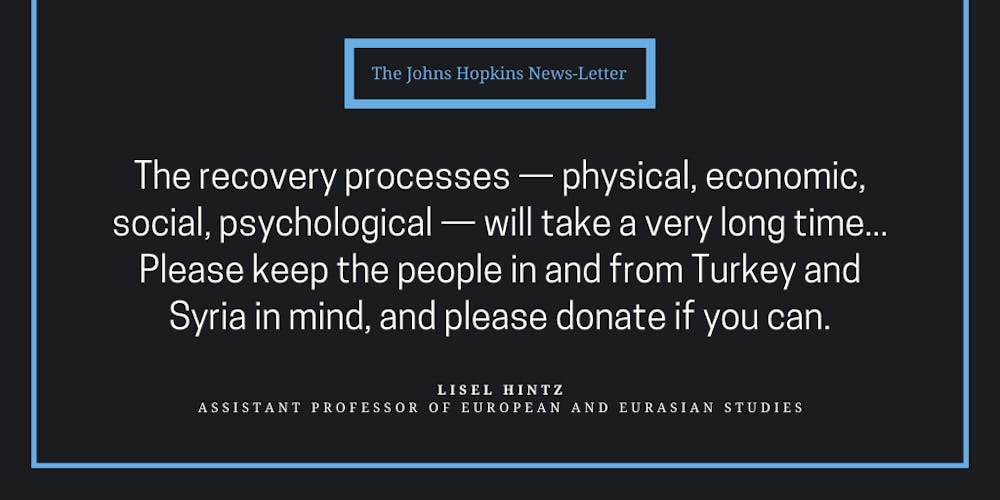In light of the 7.8 magnitude earthquake that struck parts of Turkey and Syria on Feb. 6, the Turkish Student Association (TSA) at Hopkins is raising money and collecting material goods to provide relief for victims. Currently, the death toll exceeds 40,000, and the estimated damages could exceed $20 billion.
On Feb. 10 and 13, the TSA tabled on the Breezeway and outside Hopkins Cafe. In an interview with The News-Letter, Betul Celiker, one of the fundraiser’s organizers, stated that the TSA collected winter clothing, canned and packaged food items, and medical supplies on Feb. 10, which they brought to the Embassy of Turkey in Washington for transport to Turkey.
On Feb. 13, the TSA continued to table for monetary donations, received through their Venmo, @turkeyearthquakerelief, and their page on the Turkish Philanthropy Funds website.
In an email to The News-Letter, TSA secretary Zal Ekinci described the earthquake’s impact and the need for monetary support.
“Due to the earthquake, hospitals in the vicinity of the survivors have crumbled... setting up temporary hospitals takes time and money,” he wrote. “A lot of houses have been wrecked, so residents have found themselves homeless. Temporary housing tents can help fix this issue temporarily, but there will come a time when we must rebuild.”
Celiker shared that, as of Feb. 14, the TSA has collected a total of $4,323, with $3,523 going to the Turkish Philanthropy Fund and the rest to the Save the Children Foundation. The TSA is still collecting monetary donations, and members plan to host a fundraising event on Feb. 22 at Homeslyce.
In an email to The News-Letter, Lisel Hintz, an assistant professor of European and Eurasian Studies at the School of Advanced International Studies, discussed how the earthquake’s impacts were exacerbated by the political situation in Turkey.
“What is tragic and infuriating to witness as someone who studies Turkey's politics, economics, and society is the extent to which authoritarian rule and crony capitalism exacerbated the physical damage and, most importantly, the societal cost of the earthquakes,“ she wrote.
After a 1999 earthquake in Istanbul killed over 18,000 people, many new safety regulations were created, including restrictions to prevent building on fault lines. Hintz explained that pro-government media outlets in Turkey also own construction firms that benefit from limited oversight and regulation of labor and safety standards. As a result, many regulations were ignored.
In an interview with The News-Letter, sophomore and TSA treasurer Yagmur Ozturk expressed that, while she appreciates those who donated, she expected a larger response from the University.
“Maybe because it was the Middle East or maybe because it wasn’t publicized enough, [but] we definitely did get a lot of unawareness and disappointing responses,“ she said. “I definitely think that with the school's help and... more focus on the Middle East [by the media, there] could have been a better response in terms of help.”
Hintz discussed the importance of messaging from the University in light of the disaster.
“Written expressions of condolences and support may not seem like much, but can and should communicate to students that they are not alone, that their institution is aware of the trauma they have experienced, and that resources are available to them,“ she wrote.
Hintz also stressed the necessity of continued support for those affected.
“The recovery processes — physical, economic, social, psychological — will take a very long time,” she wrote. “Unfortunately it is inevitable that another major international disaster will draw the world's attention away soon. Please keep the people in and from Turkey and Syria in mind, and please donate if you can.”





